#Gale Godon
Explore tagged Tumblr posts
Text
SUPER BOWL BALL!
LUCY & THE GRIDIRON
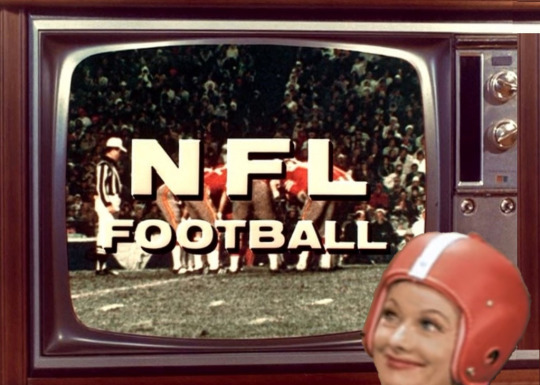
Even the Queen of Comedy was a gridiron groupie! Here’s a pigskin parade of touchdown moments of Lucy and the sport of FOOTBALL!

1934 ~ As a young model and actress, Lucille Ball didn’t just take film jobs. Here she poses in football gear with Billie Seward at Bovard Field in Los Angeles.
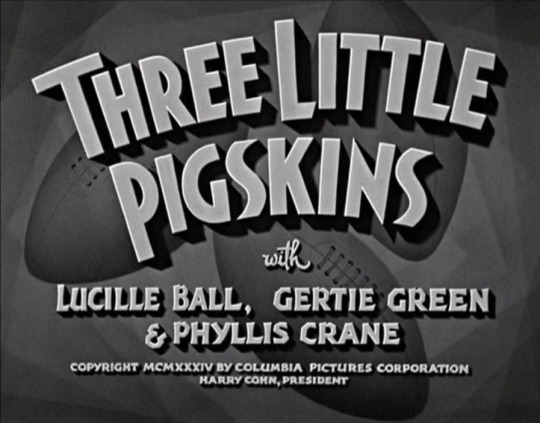
“Three Little Pigskins” (1934) ~ A football-themed film starring the Three Stooges and Lucille Ball.
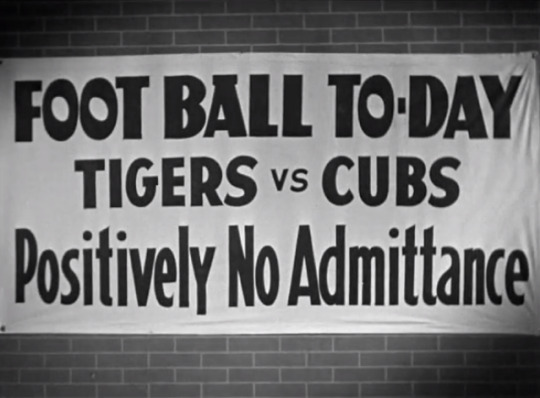
The second half of the film was shot at Gilmore Stadium. The Los Angeles stadium was newly built in 1934 and had a seating capacity of 18,000. Coincidentally, the stadium was later sold to CBS and became the site of Television City.
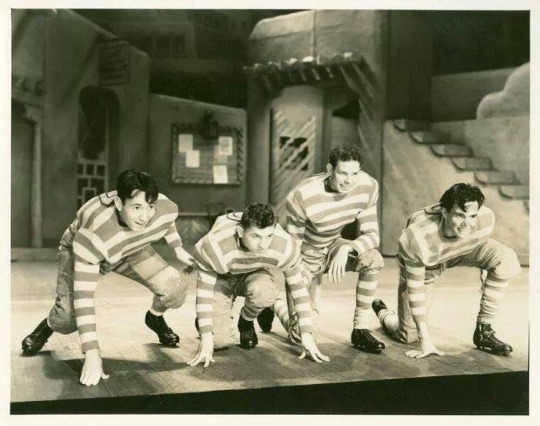
Too Many Girls (1939) ~ The Broadway production of the musical featured Eddie Bracken and Desi Arnaz as football players. Both would be featured in the film version a year later. Interestingly, it was a football injury that kept Desi Arnaz stateside during World War II.
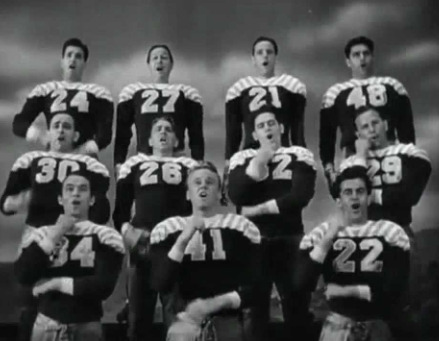
Too Many Girls (1940) ~ Van Johnson (center) was added for the film version. It was this film that introduced Lucille Ball to Desi Arnaz.
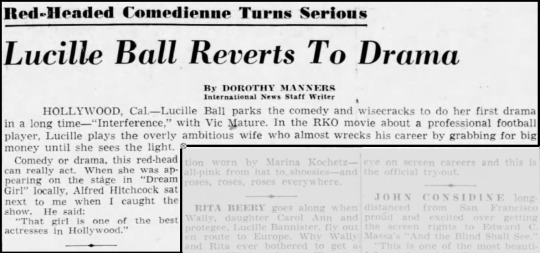
On June 26, 1948, Dorothy Manners’ column reported that Lucille Ball was cast in Interference, a film about pro football starring Victor Mature, to be produced by RKO.
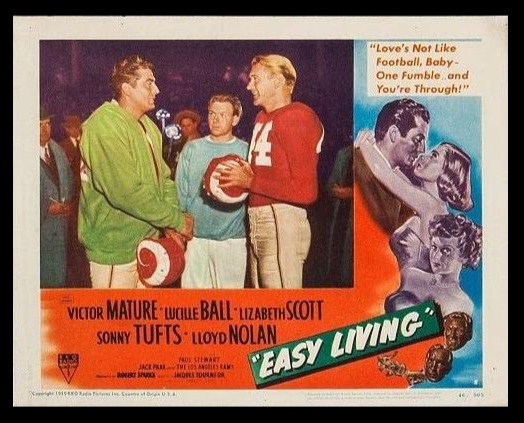
The film was not released until October 1949, by which time its title had been changed to Easy Living. The film features the real-life Los Angeles Rams football team
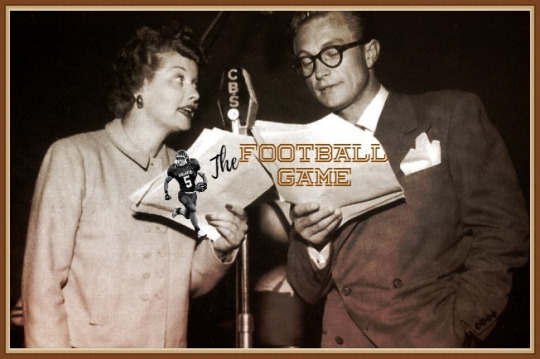
“The Football Game” (1950) ~ Liz (Lucille Ball) and Iris are determined to go to the annual State University homecoming football game with the boys, until the boys tell them they aren’t planning to take them along this time.
IRIS: I can hardly wait to get to the game and watch that old quarterback make a home run. LIZ: Iris, it’s not a home run, it’s a touchdown. And isn’t a quarterback, it’s a second baseman. RUDOLPH: It’s a shame not to take them along, George. Wouldn’t they love to see the jockey run 65 yards to a knockout?
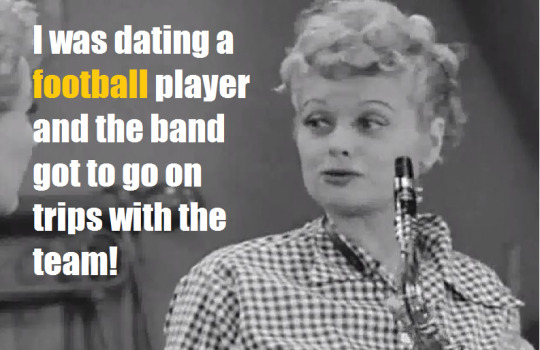
“The Saxophone” (1952) ~ When Lucy finds her saxophone, she mentions to Ethel that she was in the high school marching band in Celoron in order to date a football player.
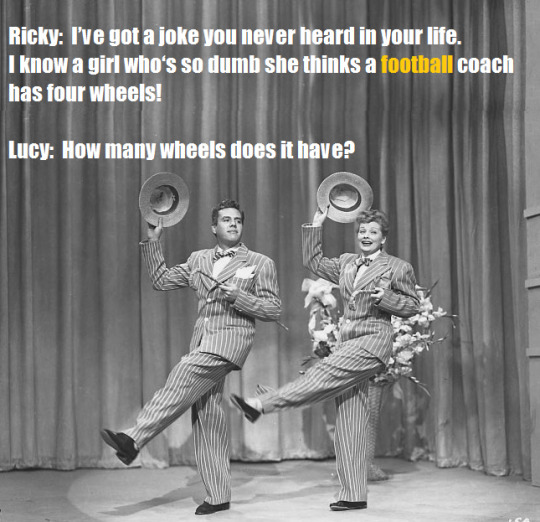
“The Benefit” (1952)
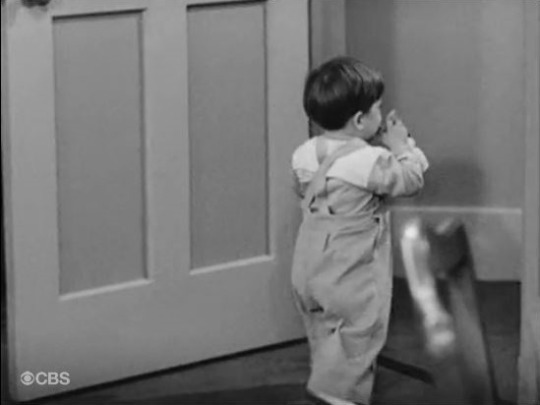
“Ricky Minds the Baby” (1954) ~ Little Ricky wanders off while Ricky and Fred watch a football game on TV.
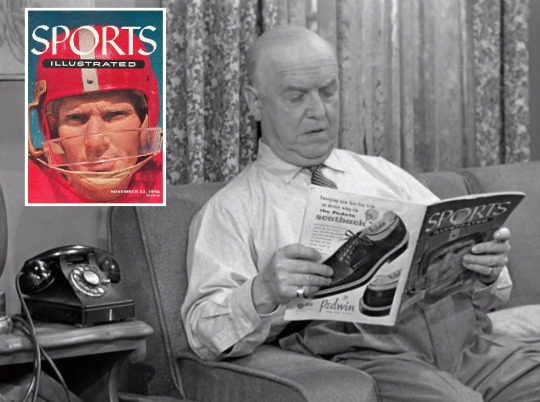
“Little Ricky Learns to Play the Drums” (1956) ~ Sports fan Fred is trying to catch up on his reading with a November 1954 copy of Sports Illustrated with San Francisco 49′ers Quarterback Y.A. Tittle, the first professional football player, on the cover.
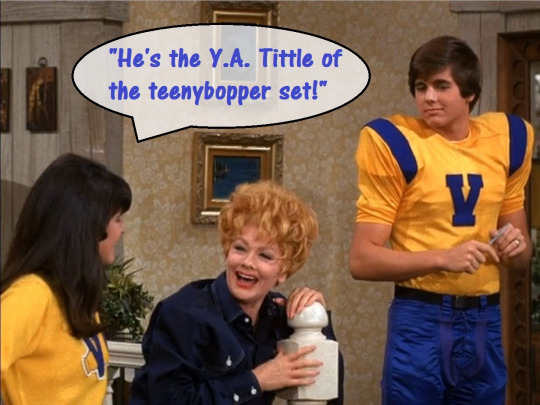
Tittle will be mentioned again in “Lucy the Fixer” (1969).
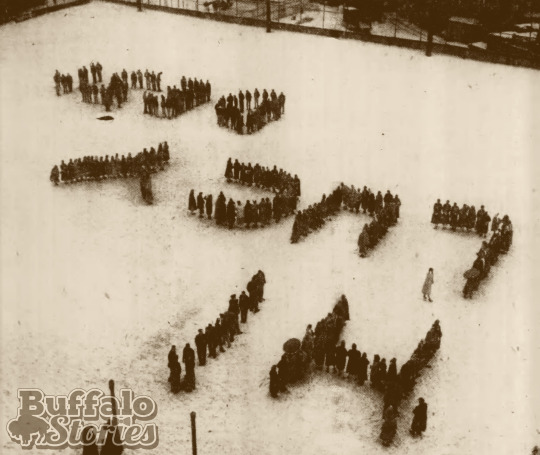
February 1956 ~ Lucy returns to Jamestown by helicopter and sees that fans have spelled out a greeting on the snow-covered Jamestown High School football field.
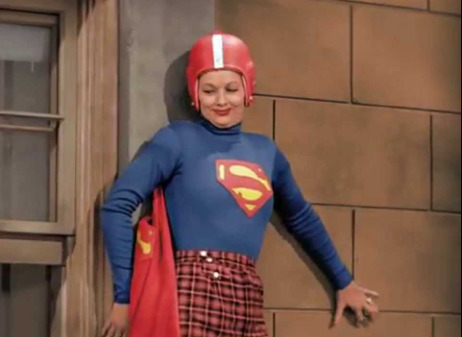
“Lucy and Superman” (1957) ~ Lucy’s make-shift Superman costume features a football helmet!
ETHEL: I still think the helmet is wrong. Superman doesn’t wear a helmet. LUCY: He would if he was trying to cover up his red hair!
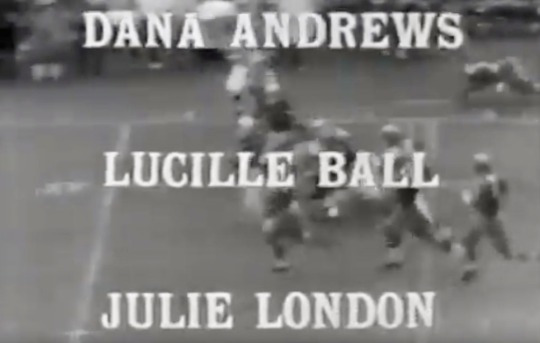
“The Bob Hope Buick Sports Award Show” (1961) ~ Lucille Ball is one of the celebrity presenters. Coincidentally, her name in the opening credits is over a football game, although she later presents an award to boxer Floyd Patterson.
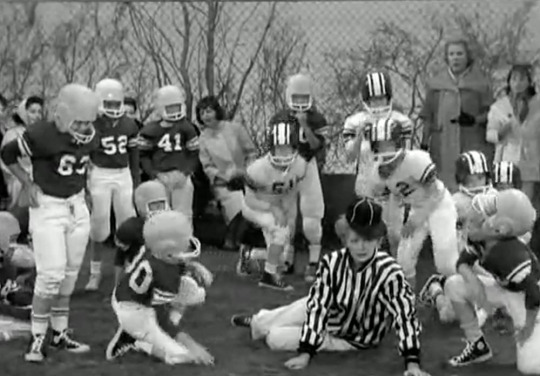
“Lucy is a Referee” (1962) ~ Jerry and Sherman’s football game is going to be canceled due to the lack of a referee, so Lucy volunteers.
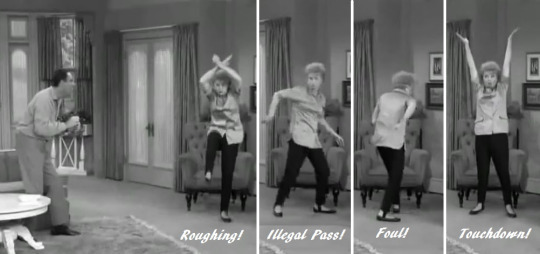
With the help of her boyfriend Harry (Dick Martin), she learns all the signals, but cannot help interfering on her son’s behalf and clumsily affecting the outcome of the game.
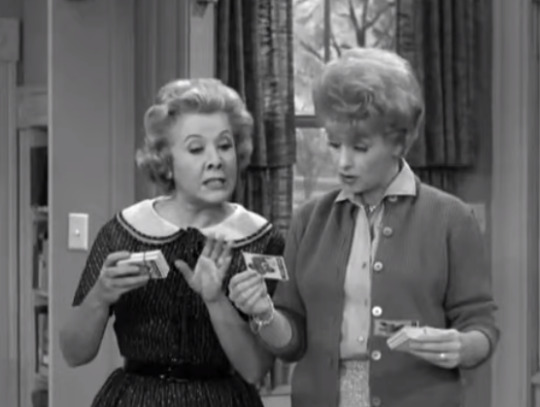
At the start of this episode, Lucy is searching for her son’s lost Johnny Unitas football card. At first, Viv thinks that Frankie Avalon and Ricky Nelson are football players, too. Lucy reads out the sports cards of ‘Red’ Phillips, then a player for the Los Angeles Rams, and Jimmy Brown, of the Cleveland Browns. Divorcee Viv laments that the players’ age and marital status are not given.
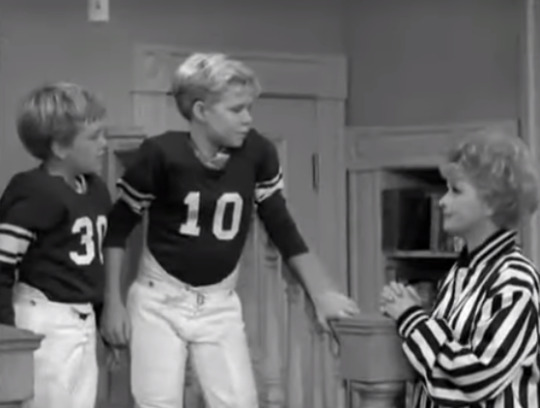
Lucy offers to take both teams to a pro football game, but a blizzard strands them all at Lucy’s house, watching the big game on TV.
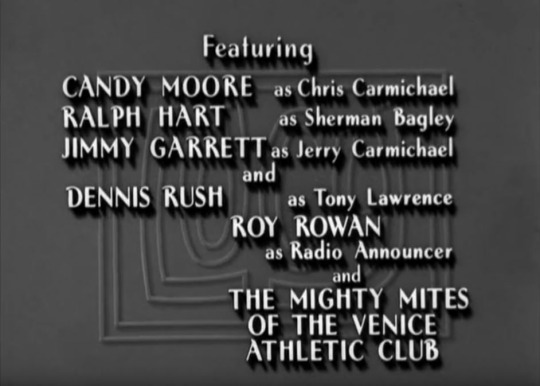
The Mighty Mites of the Venice Athletic Club was a pee-wee football team from Venice Beach, California, that took the parts of both the home and away teams in this episode.
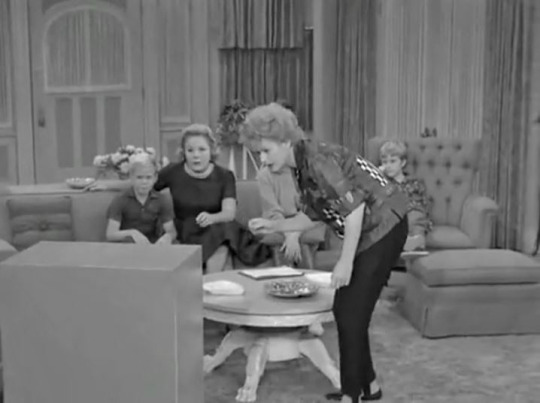
“Lucy Puts Up a TV Antenna” (1962) ~ Sherman and Jerry are excited that the All-American Football Team is going to be on TV. This continues the boys’ enthusiasm for football, established in “Lucy is a Referee”. Later, when trapped on the roof, Lucy mentions that Chris is having her music lesson and the boys are playing football.
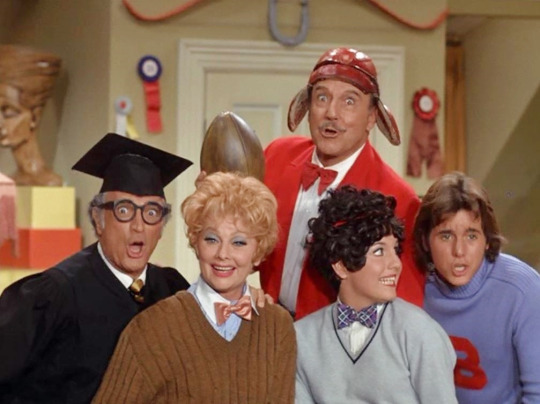
“Lucy the Co-Ed” (1970) ~ Harry’s old flame Gloria is in town to help produce a musical for their college alumni. They resurrect a show Harry wrote in college.

Harry (Gale Gordon) plays ���Crazy Hips,’ Bullwinkle University’s football star.
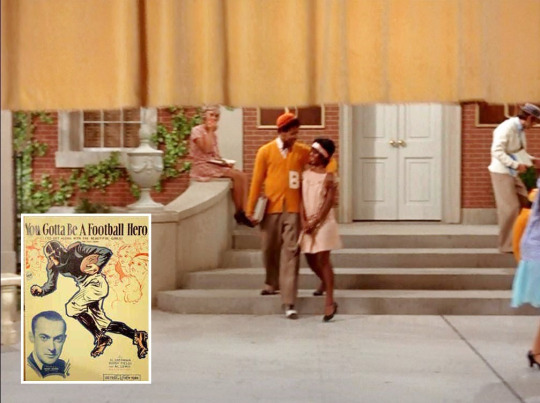
As the curtain goes up, the orchestra plays “You Gotta be a Football Hero (To Get Along with the Beautiful Girls)” written by Al Sherman, Buddy Fields and Al Lewis in 1933. It is one of the most widely recorded and performed football anthems of all time.
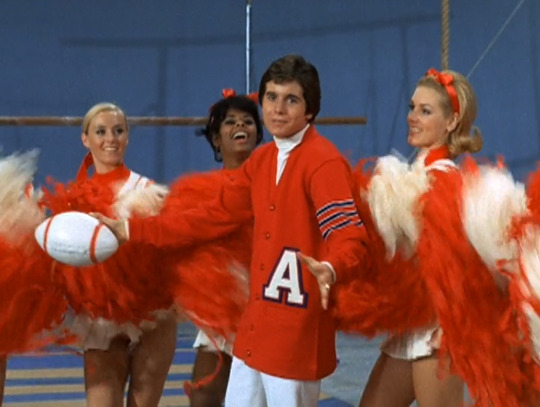
The song was first sung by Craig (Desi Arnaz Jr.) in “Lucy and Carol Burnett” (1969) to raise money for the school gym.
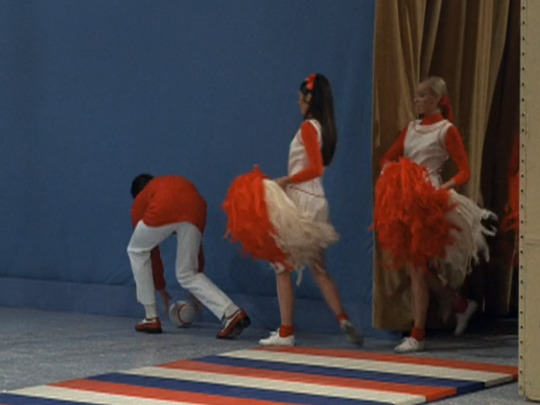
FUMBLE! The white football Craig tossed away during his solo number is stranded on stage. Desi Jr. must stoop down to scoop it up during his entrance for the finale.
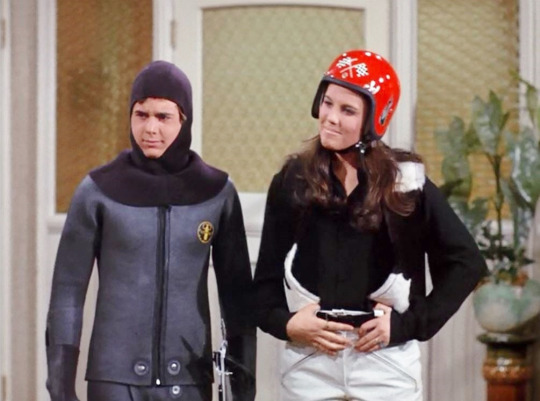
“Lucy the Skydiver” (1970) ~ When Lucy sees her daughter in a motorcycle helmet she asks if she’s playing for the Rams, Los Angeles’ hometown football team. Later, when she has the parachute pack strapped to her back, Lucy says she feels like she’s carrying the Green Bay Packers, yet another football reference in this sports-themed episode that aired (coincidentally) the same day as the premiere of Monday Night Football.
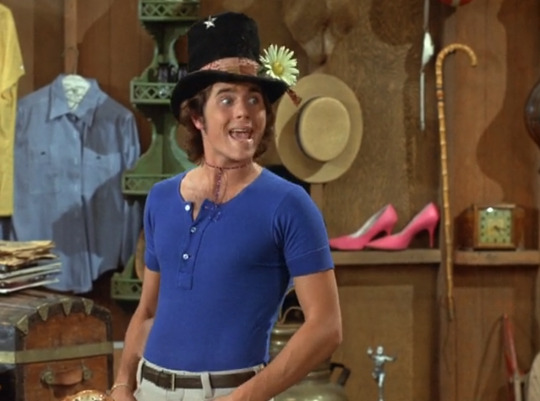
“Lucy and Aladdin’s Lamp” (1971) ~ Craig (Desi Arnaz Jr.) wishes for two tickets to the sold-our Rams Football game. After a dramatic thunder clap, Craig gets a call from his friend Alan who offers him a ticket.
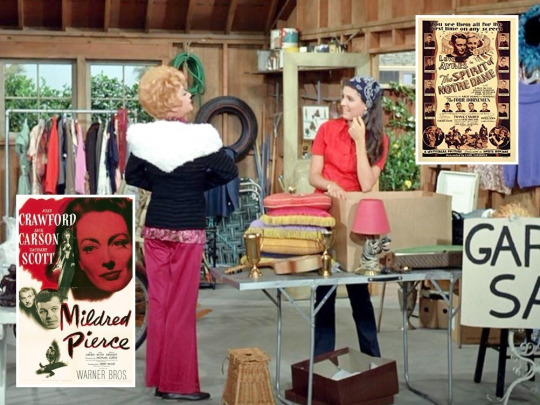
In the same episode, Lucy pulls out a fur-lined jacket she says was worn by Joan Crawford in Mildred Pierce (1945). Craig says that judging by the shoulder pads she could have worn it in The Spirit of Notre Dame, a 1931 football-themed movie starring Lew Ayres.
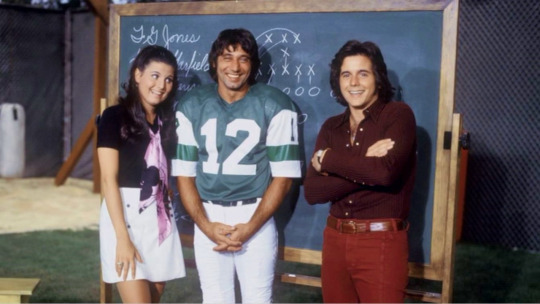
“Lucy and Joe Namath” (1972) ~ The series brings back the character of Craig for a special appearance by football player turned actor ‘Broadway’ Joe Namath.
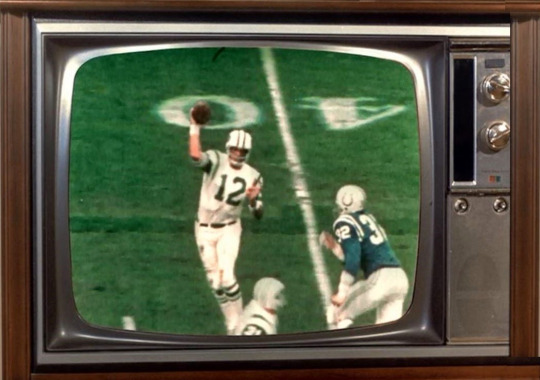
Actual clips of Namath on the field for the New York Jets (#12) are featured.
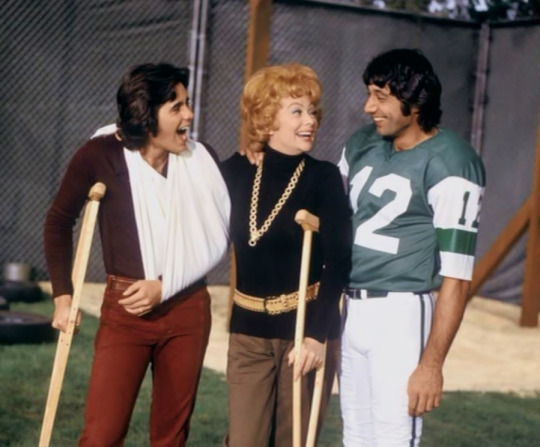
After the show was over, Namath sent Lucille Ball an autographed football.
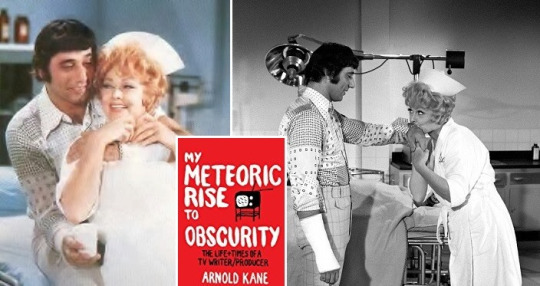
“Super Comedy Bowl” (1971) ~ In a sketch, Lucille Ball played an ER nurse who ‘manhandles’ football player Joe Namath after an accident. The sketch was written by Arnold Kane, who wrote about it in his book, My Meteoric Rise to Obscurity.
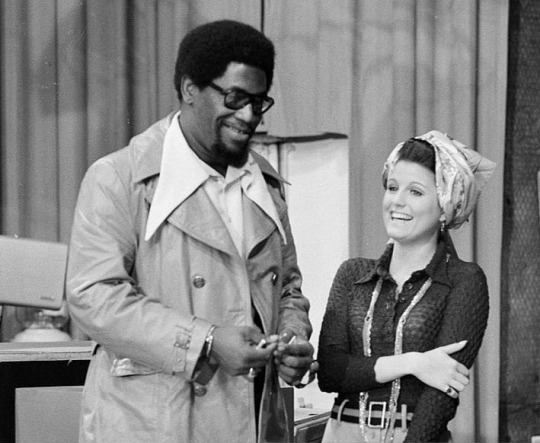
“Super Comedy Bowl” (1972) ~ The next year Lucie Arnaz followed in her mother’s footsteps, appearing on the special with football great Bubba Smith.
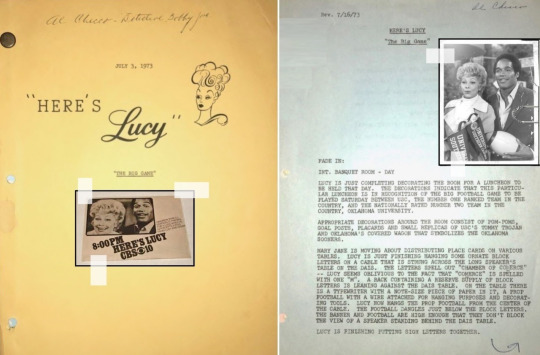
“The Big Game” (1973) ~ O.J. Simpson speaks at Harry’s Chamber of Commerce luncheon and passes on a couple of free passes to a sold out football game.
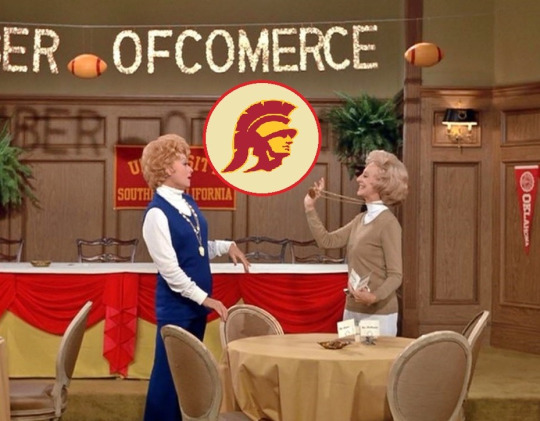
To get into the spirit of the occasion, Mary Jane brags she is wearing her Tommy Trojan pendant. Mary Jane says she learned a lot about football because of her crush on Howard Cosell,one of television’s most famous and enigmatic sportscasters.
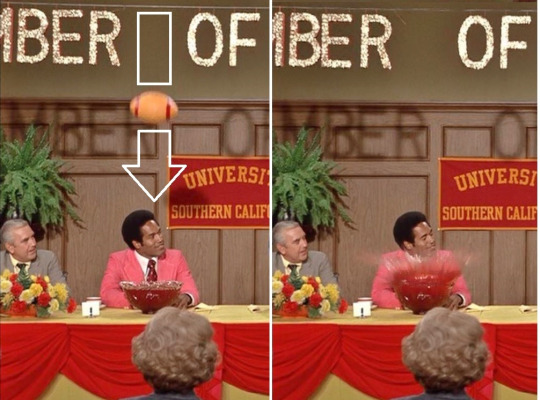
The football hanging above the head table falls into the punch bowl - splashing Simpson in the face. Touchdown!
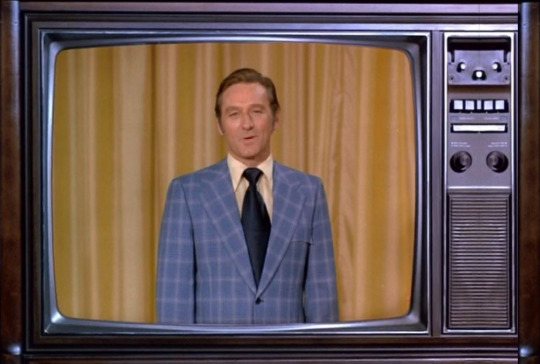
“Lucy Carter Meets Lucille Ball” (1974) ~ The on-screen announcer is played by Tom Kelly, who first called play-by-play for college football. He described the action of five USC national championship football teams, five Heisman Trophy winners, and 92 first team All-American footballers. Kelly previously played himself in “The Big Game” sharing the screen with O.J. Simpson.
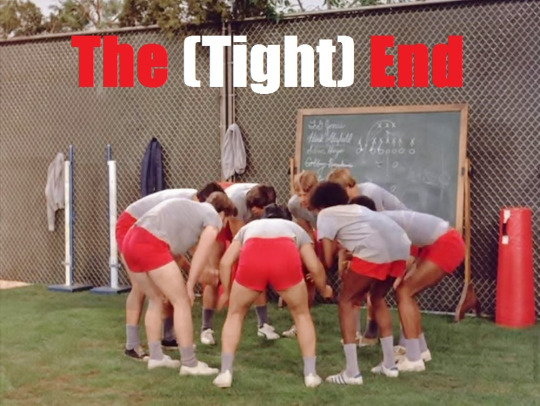
#Football#Super Bowl#Super Bowl Sunday#Lucille Ball#I Love Lucy#Desi Arnaz#Desi Arnaz Jr.#Vivian Vance#WIlliam Frawley#Joe Namath#O.J. Simpson#Tom Kelly#Jets#Rams#Bubba Smith#Here's Lucy#Lucie Arnaz#The Lucy Show#Gale Godon#Ralph Hart#Jimmy Garrett#Referee#Gridiron#Pigskin#Three Stooges#Y.A. Tittle#Easy Living#My Favorite Husband#The Big Game#NFL
2 notes
·
View notes
Text
LUCY & THE SPACE RACE
April 12th - International Space Day
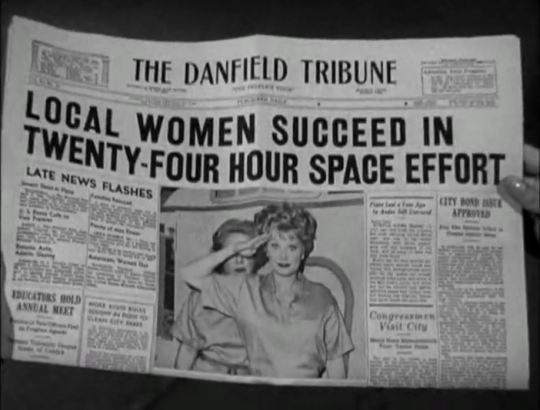
International Day for Human Space Flight takes place across the world on April 12. The day celebrates the first space flight and the first human being in space — Soviet cosmonaut, Yuri Gagarin - on April 12, 1961. Naturally, the space age ramped up on TV as well.
Long before man actually went to space, people wondered what might be up there.

In the 1950′s, America was fascinated by the idea of aliens - mainly Martians. Books, films, and television shows all captalized on this fear of the unknown.
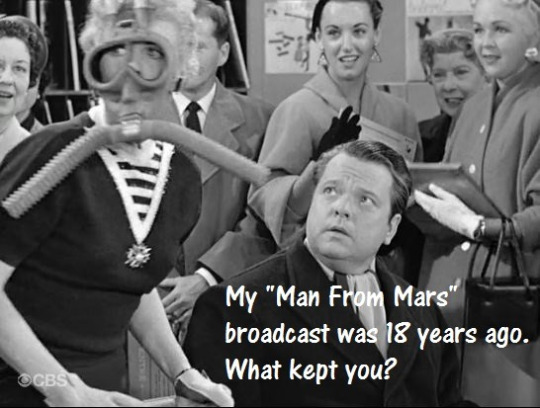
The fascination and fear of outer space can be traced back to “War of The Worlds”, an 1898 novel by H.G. Wells. In 1938, Orson Welles and the Mercury Radio Theatre used it as a basis for a broadcast that many believed to be an actual invansion from outer space.
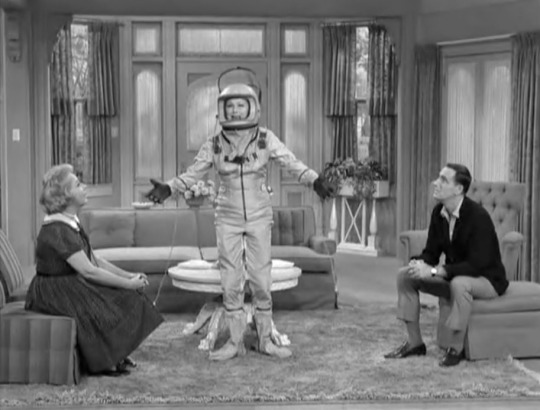
In “Lucy Becomes an Astronaut” (November 5, 1962) Lucy Carmichael and Vivian Bagley successfully spend 24 hours in a simulated space ship as part of a 'Women in Space’ experiment.

Lucy just calls it “the space program,” but her daughter Chris knows that it is actually called NASA – the National Aeronautics and Space Administration. President Eisenhower established NASA in 1958. Alan Shepard became the first American in space in May 1961, just three weeks after Russian Yuri Gargarin. Although the American team planned to launch earlier, delays continually pushed the launch back, allowing the Russian program to scoop the headlines.
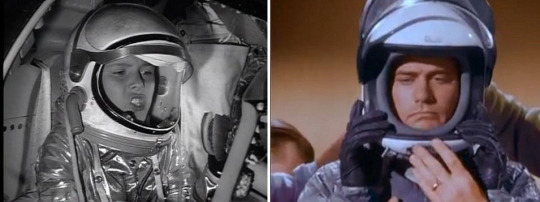
“The Lucy Show” wasn’t the only TV show to use the space program as the basis for storylines. Three months later “Dennis the Menace” aired “Junior Astronaut,” where Dennis and his classmates participate in the 'Junior Astronaut’ savings-stamp program. This episode starred Gale Godon, who would join “The Lucy Show” cast in season two. Star Jay North did a short promotional film for the real-life savings-stamp program to support NASA.

Also in January 1963, “McKeever & the Colonel,” a one-season sitcom that premiered on NBC a week before “The Lucy Show”, explored the topic in “McKeever’s Astronaut,” where a visiting astronaut turns out to be a chimp. Although not in the cast of this particular episode, Charles Lane (Lucy Carmichael’s banker Mr. Barnsdahl) was featured on the series in November 1962. Shirley Mitchell (Lucy Ricardo’s friend Marion Strong) was in the series premiere.
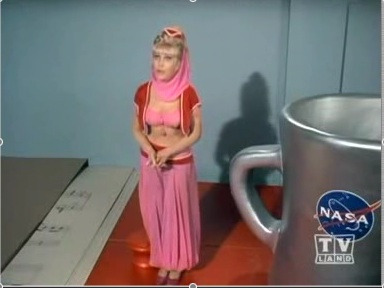
The most famous example of the space program on television is the sitcom “I Dream of Jeannie,” which premiered in 1965. It not only featured astronauts as the central characters, it was set in Cape Canaveral, Florida. After John F. Kennedy’s assassination in 1963, the name was changed to Cape Kennedy. It reverted to Cape Canaveral a decade later, although the NASA facilities are still known as the Kennedy Space Center. Jeannie was played by Barbara Eden, who made her sitcom debut on a 1957 episode of “I Love Lucy.”

Lucy revisited the subject on October 11, 1971 on the “Here’s Lucy” episode “Lucy and the Astronauts”. When Harry and Lucy attend a splash down, she rushes to hug the returning crew before they can be medically cleared, meaning she and Harry must be quarantined with the astronauts.
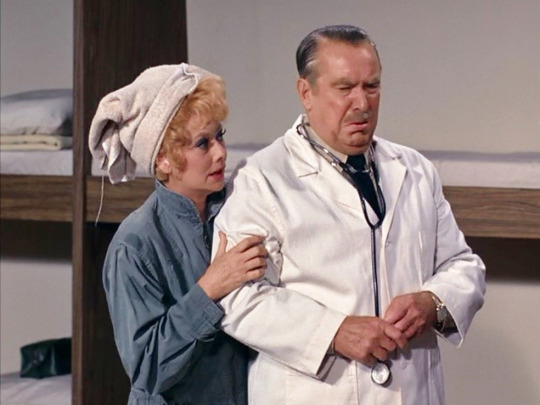
Barely tolerating Lucy in the isolation unit, Dr. Jamison (Roy Roberts) grumbles “We never had this trouble with Neil Armstrong.” Neil Armstrong was the first American astronaut to set foot on the moon on July 21, 1969. Armstrong traveled with Buzz Aldrin on Apollo 11. His famous quote when he stepped onto the moon’s surface was “That’s one small step for man, one giant leap for mankind.”

The episode incorporates stock footage of televised moon walks and splash downs.

This episode was featured in a set of View-Master reels. The View-Master system was introduced in 1939 by GAF, four years after the advent of Kodachrome color film.
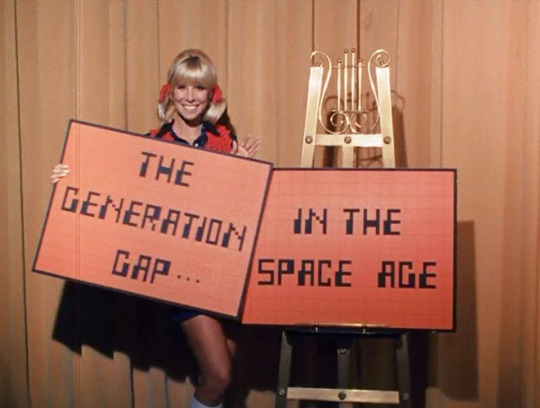
The third act of “Lucy and the Generation Gap” (1969) was set in a futuristic space age in a musical comedy context.
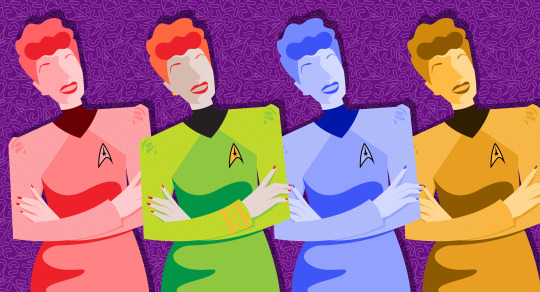
In 1966, Desilu produced a science fiction series that explored life in outer space - “Star Trek”. Each episode started with the iconic phrase:
“Space: The Final Frontier”
Ball was friends with Majel Barrett and thought Gene Rodenberry was a talented creator. She supported the show when the network rejected it. Thanks to Lucy, the now iconic franchise has immeasurably contributed to the popularity of the space program.
#Lucille Ball#Space#Outer Space#NASA#TV#I Love Lucy#The Lucy Show#Here's Lucy#Star Trek#April 12#Astronaut
5 notes
·
View notes
Photo

RIP Dick Gautier (1931-2017) ~ who made an appearance on LIFE WITH LUCY in 1986.
3 notes
·
View notes
Text
HY AVERBACK
October 21, 1920

Hyman Jack Averback was an accomplished Producer / Director and Actor who was born in Minneapolis and moved to California with his family when he was 9. He graduated from the Edward Clark Academy Theater in 1938 and eventually got a job announcing at KMPC Beverly Hills before World War II.

As part of the Armed Forces Radio Service, he entertained troops in the Pacific with his program of comedy and music. He created the character of Tokyo Mose, a lampoon of Japan's Tokyo Rose.
After his discharge, his big break came when he was hired to announce "The Jack Paar Show”, which replaced Jack Benny on radio for the summer of 1947. He became the announcer for Bob Hope on NBC in September 1948.

His first screen appearance as an actor was under the name Hy Averbach in Cry Danger (1951) starring Dick Powell and Rhonda Fleming.

In October 1951 he made his television debut (as himself) on “Chesterfield Sound Off Time” on NBC.

In October 1953 he created the role of Charlie Apppleby, husband of Lucy’s ‘frenemy’ Caroline, in “Baby Pictures” (ILL S3;E5). Charlie was the manager of a television station. The next time we see Charlie Appleby he will be played by George O'Hanlon (inset photo) in “Lucy and Superman” (S6;E13).

“Dad, I’m gonna make you the Cuban Liberace!” ~ Charlie Pomerantz
Averback returned to the show to play another Charlie, Charlie Pomerantz, in “The Hedda Hopper Story” (S4;E20). Pomerantz was Ricky’s Hollywood Press Agent. The character was named after the West Coast Publicity Agent for Philip Morris, the show’s main sponsor.

In 1954 and 1955, Averback did two episodes of “The Danny Thomas Show,” filmed by Desilu. In late 1958 and early 1959, the Williams’ and the Ricardos’ made reciprocal appearances on each others’ shows.

In May 1955, Averback played Mr. Harmon on an episode of Desilu’s “December Bride”. In 1957, Executive Producer Desi Arnaz appeared on the series as himself.

From 1952 to 1956 he did seven episodes of “Our Miss Brooks,” also filmed at Desilu. He mostly played Roberto Romeo with Gale Gordon as Osgood Conklin.

Hy Averback served as the Announcer for the first episode of “The NBC Comedy Hour” (previously known as “The Colgate Comedy Hour”) in January 1956. That episode also starred William Frawley (Fred Mertz), crossing network lines.

When “Brooks” went off the air, he switched to “Box” - and also moved from acting to behind the cameras as director. He directed two episodes of “The Box Brothers” (aka “The Brothers”) starring Gale Godon, but the show was not a success.

After its failure, he returned to Desilu Studios to direct “The Real McCoys” and ended up directing 102 episodes from 1957 to 1960. He was once again directing an “Our Miss Brooks” co-star; this time Richard Crenna. His work earned him a 1959 Emmy nomination. A 1960 episode he directed featured Doris Singleton (Caroline Appleby, his “Lucy” wife) as a character named Ethel!

Averback is best remembered for directing 20 episodes of “M*A*S*H” (1972-82) which earned him his second and third Emmy nominations.

His final screen project was directing the pilot of “The Last Precinct” in 1986.
He was married to Dorothy Averback. He died on October 14, 1997.

A former announcer, he was the voice of the "M*A*S*H” loudspeaker operator. In one episode, he says
"...and that's it from me, Hy Averback."
#I love Lucy#Hy Averback#Lucille Ball#Doris Singleton#M*A*S*H#The Last Precinct#William Frawley#Desi Arnaz#The Real McCoys#The Box Brothers#Gale Gordon#Our Miss Brooks#December Bride#The Danny Thomas Show#TV#Sound Off Time#Cry Danger#Toyko Mose#Emmy Nominee
2 notes
·
View notes
Text
Lucy Becomes an Astronaut
S1;E6 ~ November 5, 1962


Synopsis
Lucy and Viv successfully spend 24 hours in a simulated space ship as part of a "Women in Space" experiment. Lucy's ego swells from the publicity so Viv and Harry decide to deflate it by convincing Lucy that she's been chosen to be the first woman astronaut.
Regular Cast
Lucille Ball (Lucy Carmichael), Vivian Vance (Vivian Bagley), Jimmy Garrett (Jerry Carmichael), Ralph Hart (Sherman Bagley), Candy Moore (Chris Carmichael), Dick Martin (Harry Connors)
Guest Cast

Nancy Kulp (Jane Corey) played the cockney hotel maid who teaches Lucy how to curtsy in “Lucy Meets the Queen” (ILL S5;E15). Born in Harrisburg, PA, Kulp will always be remembered as Miss Jane Hathaway, the upright secretary of banker Drysdale on “The Beverly Hillbillies” (1962-1971) which premiered just five days before “The Lucy Show.” The role of Miss Hathaway earned Kulp an Emmy nomination in 1967. She made an unsuccessful run for Pennsylvania congress in 1984, after which she retired and taught acting. Kulp died of cancer in 1991.

The episode also employs a dozen middle-aged women as extras in the “Women in Space” program luncheon. Several sources claim Alix Talton was among them. A former Miss Georgia, Talton acted in a handful of films and TV shows in a career that spanned several decades, including seven episodes of “My Favorite Husband,” which was the television version of Lucille Ball's radio show of the same name.


Lucy and Viv were ensigns in the WAVES (Women Accepted for Volunteer Emergency Service), which was the World War II women's branch of the U.S. Naval Reserve. It was established in 1942 in order to release officers and men for sea duty and replace them with women in shore establishments. By September 1946, the last of the WAVES had been discharged. The WAVE sponsored “Women in Space” program depicted in the episode is fictional.

Lucy jokingly says that she served with Admiral Dewey at Manilla. George Dewey (1837–1917) was Admiral of the U.S. Navy. He was best known for his victory at the Battle of Manila Bay during the Spanish–American War in May 1898.
Lucy just calls it “the space program,” but Chris knows that it is actually called NASA – the National Aeronautics and Space Administration. President Eisenhower established NASA in 1958. Alan Shepard became the first American in space in May 1961. In February 1962 U.S. Colonel John Glenn made three orbits around the Earth. In this episode, Viv sarcastically calls Lucy 'Colonel Glenn' Carmichael.

There is a reference to a long distance call from Cape Canaveral, Florida, the home of NASA and a location that has became synonymous with the U.S. space program. After John F. Kennedy's assassination in 1963, the name was changed to Cape Kennedy. It reverted to Cape Canaveral a decade later, although the NASA facilities are still known as the Kennedy Space Center.
Just eight months after this episode aired, Soviet cosmonaut Valentina Tereshkova became the first woman in space in June 1963. It would take the U.S. twenty more years to equal that achievement when Sally Ride went into space in June 1983.

During the isolation experiment, Viv gets claustrophobic. In real life it was Lucille Ball who suffered from claustrophobia, not Vivian Vance.
An unenthusiastic Viv says that by participating in the isolation experiment she is missing a big party with lots of Broadway celebrities that Eddie invited her to. Eddie Collins, Viv's sometimes boyfriend, hasn't been seen since “Lucy Digs Up a Date” (S1;E2).

On the telephone with what she thinks is NASA, Lucy nervously says: “Off in the 'wild blue' what sir?” This is a reference to the “Air Force Song,” the first line of which is “Off we go, into the wild blue yonder.”
Lucy quotes John F. Kennedy's iconic inauguration speech of January 20, 1961:
“Ask not what your country can do for you; ask what you can do for your country.”
Later, fearing the dangers of space travel, Lucy tearfully regrets her enthusiasm:
“I collect for the Red Cross. I buy savings bonds. I was with the WAVES. How much does that man in the White House want from me?”
When hearing about a splash down, Lucy says she can't swim.
We see that the local newspaper is The Danfield Tribune.

“The Lucy Show” wasn't the only TV show to use the space program as the basis for storylines. Three months later “Dennis the Menace” aired “Junior Astronaut,” where Dennis and his classmates participate in the 'Junior Astronaut' savings-stamp program. The one who buys the most stamps wins a trip to Cape Canaveral to meet an astronaut. This episode starred Gale Godon, who would join “The Lucy Show” cast in season two. It also boasted John 'Shorty' Powers, who was a real-life NASA officer at the time. Star Jay North did a short promotional film for the real-life savings-stamp program to support NASA.

Also in January 1963, “McKeever & the Colonel,” a one-season sitcom that premiered on NBC a week before “The Lucy Show”, explored the topic in “McKeever's Astronaut,” where a visiting astronaut turns out to be a chimp. Although not in the cast of this particular episode, Charles Lane (Lucy Carmichael's banker Mr. Barnsdahl) was featured on the series in November 1962. Shirley Mitchell (Lucy Ricardo's friend Marion Strong) was in the series premiere.

The most famous example of the space program on television is the sitcom “I Dream of Jeannie,” which premiered in 1965. It not only featured astronauts as the central characters, it was set in Cape Canaveral, Florida. Jeannie was played by Barbara Eden, who made her sitcom debut on a 1957 episode of “I Love Lucy.”

“Here's Lucy” also featured a NASA-themed episode titled “Lucy and the Astronauts” (HL S4;E5) in 1971. The episode also features an 'isolation' element when space nut Lucy must go through decontamination with astronauts when she accidentally makes physical contact with them just after landing. This episode was commercially released on View-Master slides!

In June 1963 Gold Key published their first issue of “The Lucy Show” comic books. Although the main photo was from “Lucy Puts Up an Antenna” (S1;E9), there was a small colorized inset photo from this episode of Lucy, Viv and the kids looking at the newspapers reporting about Lucy and Viv’s experiment.
Callbacks!

In “Lucy's Club Dance” (ILL S3;E25) the headline of the New York Gazette reads “Bond Issue Defeated.” The same exact prop newspaper was used in “Ricky’s Old Girlfriend” (ILL S3;E12). Here, eight years later, a headline in The Danfield Tribune is “City Bond Issue Approved”!

The paper also has a smaller headline: “Plane Lost a Year Ago in Andes Still Untraced." This article actually appeared in The New York Times on July 20, 1933. It reported the continuing mystery of the 1932 disappearance of a Pan American Airlines flight from Santiago, Chile to Buenos Aires, Argentina. Eight months after the article, the plane was found four miles south of Puente Del Inca, Argentina. Coincidentally, the very same side headline appeared on a newspaper used on a January 1961 episode of CBS's “Perry Mason.”
Blooper Alerts!

Cut the Cord! After Lucy hangs up the phone while in the space suit, one of the cords dangling from the suit get's snagged on the telephone cord. Lucy quickly untangles it without missing a beat.

“Lucy Becomes an Astronaut” rates 4 Paper Hearts out of 5
#The Lucy Show#Lucille Ball#Vivian Vance#Lucy Becomes an Astronaut#Lucy Carmichael#NASA#1962#Nancy Kulp#WAVES#Space Program
3 notes
·
View notes